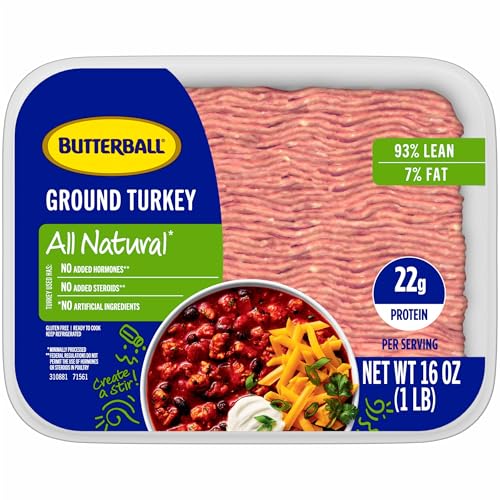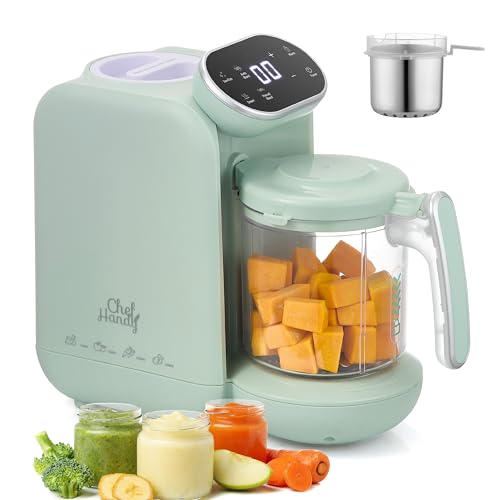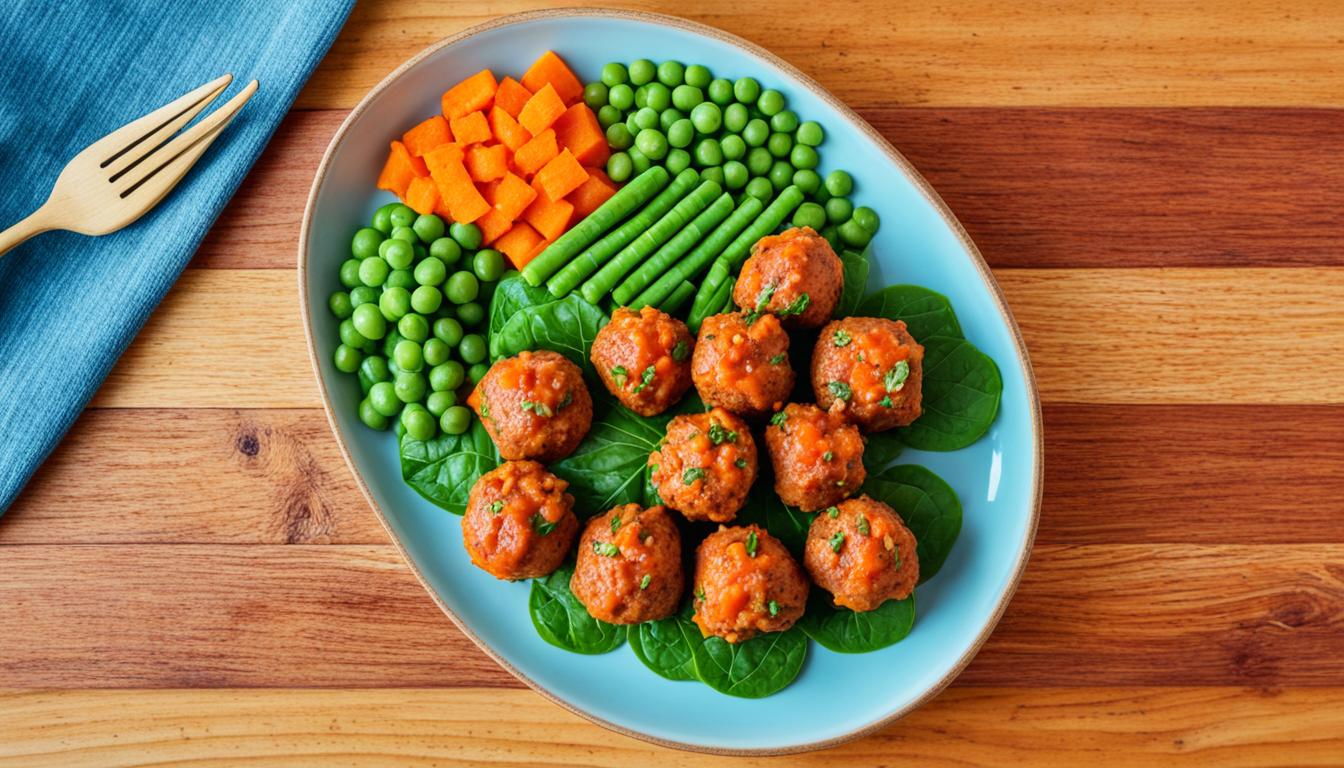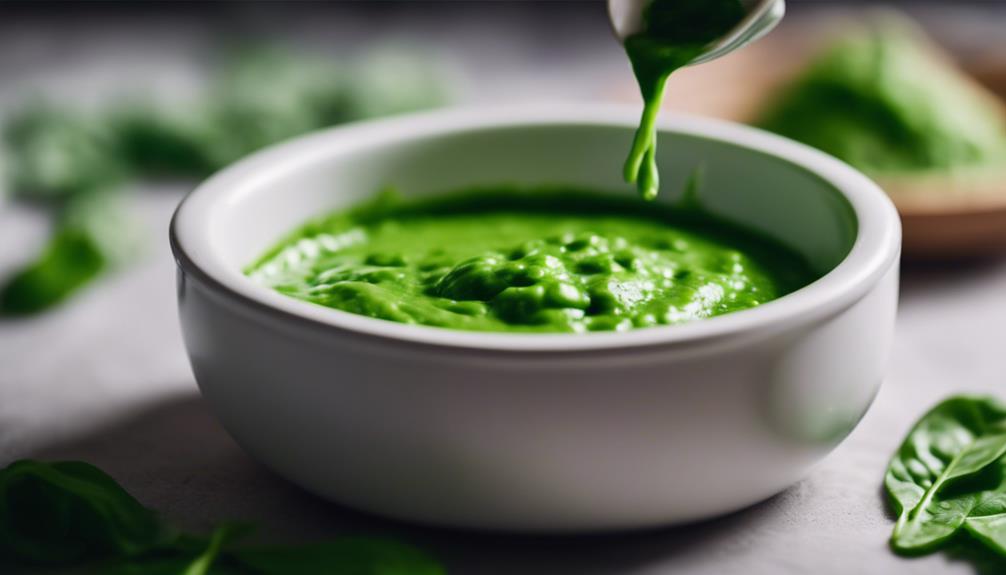You aim for the best when it comes to your little one. You try to give them healthy, flavorful meals. It’s tough to find convenient, nutritious baby food. Wholesome turkey meatballs are a great fix.
Your baby will love reaching for a yummy, home-cooked turkey meatball. Their face will light up! These meatballs are full of protein and nutrients, making them perfect for your baby’s diet.
Why choose turkey? It’s lean, full of key nutrients and vitamins essential for growth. Plus, you can make turkey meatballs ahead of time. This makes meal prep for your baby much easier.
Ready to cook something amazing for your little one? We’ll show you how to prepare delicious turkey meatballs. You’ll get all the details on ingredients, how-tos, and tips for making lots ahead. Let’s dive in!
Key Takeaways:
- Wholesome turkey meatballs are great for your baby’s diet.
- Turkey is nutritious, helping your baby grow strong.
- Make meatballs in advance to ease meal prep.
- We provide recipes, instructions, and storage tips.
- Prepare to make meals your baby will adore!
Why Choose Turkey Meatballs for Your Baby?
When starting your baby on solid foods, picking the right food is key. Turkey meatballs are a great choice. They are both nutritious and tasty for your little one’s meals.
Turkey is low in fat but high in protein. Perfect for growing kids. It’s packed with vital nutrients like iron, zinc, and vitamin B12. These are key for your child’s growth. Adding turkey meatballs to their diet provides these important nutrients.
Turkey meatballs are also very adaptable. You can mix in various herbs and spices. This adds variety and helps your baby discover new tastes. It’s a fun way to help them learn what they like during meals.
They are also simple to make. You can cook a bunch at once for later. Turkey meatballs can be baked or steamed, making them healthier. No need for extra oils or fats. Unlike store-bought baby foods, homemade ones don’t have unwanted additives. Making turkey meatballs at home lets you know exactly what your baby is eating.
Turkey meatballs are both nutritious and easy to change up for your baby’s meals. They’re key for introducing new flavors. Plus, homemade means no additives.
So, why choose turkey meatballs for your baby? They’re a smart, wholesome choice. They help ensure a balanced diet and introduce lots of flavors. Start your baby off right with turkey meatballs in their diet.
Ready to make turkey meatballs? Let’s check out the needed ingredients. Gather what you need, and let’s start cooking!
| Benefits of Turkey Meatballs for Babies | Reasons to Choose Turkey Meatballs |
|---|---|
| 1. Lean source of protein | 1. Nutritious and delicious |
| 2. Low in fat | 2. Customizable flavors |
| 3. Provides essential nutrients | 3. Easy to prepare and batch-cook |
| 4. Helps develop taste preferences | 4. Control over ingredients |

Butterball, Fresh All Natural 93%/7% Lean Ground Turkey, 1 lb
Includes 1 lb. of Butterball Fresh 93%/7% Lean Ground Turkey
As an affiliate, we earn on qualifying purchases.
As an affiliate, we earn on qualifying purchases.
Essential Ingredients for Turkey Meatballs
Making turkey meatballs at home is excellent for introducing new flavors to babies. It’s very healthy because they are rich in protein. Here is what you will need to make them both tasty and good for your child:
Turkey:
The main ingredient is turkey, which needs to be lean and flavorful. Use ground turkey to make your job easier. Make sure it’s fresh and top-quality.
Breadcrumbs:
Breadcrumbs help hold the meatballs together and add texture. Opt for whole wheat breadcrumbs to boost the dish’s healthiness.
Egg:
An egg will make the ingredients stick together. It also keeps the meatballs moist and soft.
Herbs and Spices:
Adding herbs and spices will make the meatballs tastier. Try garlic, oregano, parsley, salt, and pepper. You can also try different herbs to find what your baby likes best.
Vegetables:
It’s good to add vegetables to your baby’s diet for better nutrition. Mixing in finely chopped veggies like onions, carrots, or spinach adds nutrients and taste to the meatballs.
Olive Oil:
A bit of olive oil is great for cooking the meatballs. It gives them a nice crust and locks in flavor.
Parmesan Cheese (optional):
Adding parmesan cheese can make the meatballs even more delicious, if your baby is okay with dairy. If not, it’s easy to just leave it out.
With these essential ingredients, you can make yummy and healthy turkey meatballs for your child. Keep reading to find out how to put it all together in the next section.


DRKIO 6 Pack Glass Baby Food Storage Containers – 4 Oz Baby Food Jars with Lids Baby Food Maker Microwave Dishwasher Freezer Safe 100% Leak Proof BPA Free Reusable
PREMIUM BABY FOOD-GRADE MATERIAL: Prioritizing durability and baby health, our containers are crafted from superior, thicker food-grade glass…
As an affiliate, we earn on qualifying purchases.
As an affiliate, we earn on qualifying purchases.
Step-by-Step Guide to Making Turkey Meatballs
Creating turkey meatballs at home is easy and fun. Follow these steps for tasty and healthy meals for your baby.
Step 1: Gather Your Ingredients
First, make sure you have everything you need. Here are the ingredients:
- Ground turkey
- Breadcrumbs or oat flour
- Egg
- Finely chopped vegetables (carrots, zucchini, spinach, etc.)
- Garlic powder
- Onion powder
- Herbs and spices of your choice
- Olive oil
Step 2: Mix the Ingredients
Put the turkey, breadcrumbs or flour, egg, veggies, garlic and onion powders, and herbs in a bowl. Mix them well, using your hands or a spoon.
Step 3: Form the Meatballs
Take a bit of the mixture and roll it into a small meatball. Keep going until you use all the mix. Put the meatballs on a plate or baking sheet.
Step 4: Cook the Meatballs
You can cook the meatballs in two ways. Bake at 375°F (190°C) for 20-25 minutes. Or pan-fry in olive oil until they’re golden and cooked inside.
Step 5: Allow to Cool and Serve
Let the meatballs cool a bit before giving them to your baby. Cut them into small pieces. Make sure they’re cool enough for your baby.
This guide helps you make yummy turkey meatballs. They’re full of good stuff for your baby’s growth.


Chefhandy Baby Food Maker with Stainless Steel Steam Basket, 5-in-1 Baby Food Processor, Steamer & Blender, Auto Cooking, Pureeing, Reheating & Steam Cleaning, BPA-Free, 6 Reusable Pouches, Green
𝗠𝘂𝗹𝘁𝗶𝗳𝘂𝗻𝗰𝘁𝗶𝗼𝗻 𝗕𝗮𝗯𝘆 𝗙𝗼𝗼𝗱 𝗠𝗮𝗸𝗲𝗿: Our Chefhandy baby food processor combines steaming, blending, auto blend, manual blend, and milk…
As an affiliate, we earn on qualifying purchases.
As an affiliate, we earn on qualifying purchases.
Tips for Batch Cooking and Storing Turkey Meatballs
Batch cooking turkey meatballs for your little one can change the game. Taking time to prepare a big batch can save you time and effort later. Here’s how to make it easy and efficient:
1. Choose the Right Quantity
First, figure out how many meatballs you need. Think about how much your baby eats and how many meals you’re planning for. It will guide you in adjusting the recipe just right.
2. Prepare a Cooking Strategy
Use different cooking methods at the same time to save time. You can bake some meatballs in the oven and cook others on the stove. This will help you cook more meatballs faster.
3. Storage Containers
Get some airtight containers or freezer bags for storing your meatballs. Use individual portions to make serving easy and reduce waste. Don’t forget to label them with the preparation date to track their freshness.
4. Portion Control
Divide the meatballs based on how much your baby eats. Smaller portions work well for little babies, and older ones might want more. This makes it easy to defrost the right amount for meals.
5. Freezing and Defrosting
Let the meatballs cool before freezing them. Then, put them in a freezer bag to save space. To serve, defrost what you need in the fridge overnight or quickly in the microwave. Always heat them well before serving.
These tips can make preparing baby food like turkey meatballs easier. With batch cooking and the right storage, you’ll spend less time cooking and more with your baby.

| Tip | Description |
|---|---|
| Choose the Right Quantity | Determine the quantity of turkey meatballs based on your baby’s appetite and weekly servings. |
| Prepare a Cooking Strategy | Optimize your cooking process by using different cooking methods simultaneously. |
| Storage Containers | Invest in airtight containers or freezer-safe bags to store your turkey meatballs. |
| Portion Control | Consider portioning the meatballs according to your baby’s needs. |
| Freezing and Defrosting | Properly freeze the meatballs and defrost them as needed before serving. |

PandaEar 3 Pack Baby Food Freezer Tray with Lids, Silicone Baby Food Storage Container for Homemade Baby Food, Purees, Breastmilk (Blue/Green/Carnation)
Effortless Meal Preparation: Streamline your baby's nutrition with our 3 Pack Silicone Freezer Tray. Batch prepare baby food,…
As an affiliate, we earn on qualifying purchases.
As an affiliate, we earn on qualifying purchases.
Serving Suggestions for Turkey Meatballs
You’ve made a tasty batch of turkey meatballs. Now, let’s find fun ways to serve them to your little one. Variety in flavors and textures will give your baby a well-rounded meal. This keeps mealtime exciting.
Here are some serving suggestions:
1. Classic Spaghetti and Meatballs
Make an Italian favorite with your turkey meatballs. Serve them with whole wheat spaghetti and rich tomato sauce. This dish will become a favorite for your baby.
2. Meatball Sliders
Create mini meatball sliders with small whole wheat buns. Add a slice of cheese and fresh veggies for more nutrition. It’s a fun, bite-sized meal.

3. Meatball Skewers
Put turkey meatballs on skewers with cherry tomatoes, bell peppers, and zucchini. Whether grilled or baked, these skewers are both nutritious and appealing.
4. Meatball and Veggie Rice Bowl
Serve your meatballs over steamed brown rice and mixed veggies. A homemade sauce on top adds extra flavor. It’s a balanced meal.
You can also try turkey meatballs in soups, on pizzas, or in wraps and sandwiches. There are so many options!
Always think about your baby’s age and what they can safely chew. Make sure meatballs are the right size and fully cooked to prevent choking.
With all these ideas, have fun cooking. Watch your little one enjoy these healthy turkey meatballs!
Adjusting the Recipe for Different Ages and Tastes
Homemade turkey meatballs are great because you can change the recipe for your baby. You can make it work for babies just starting to eat solids or older kids. This way, you can match the recipe to what they like and need.
Here are some tips on adjusting the recipe:
1. Texture:
For babies new to eating, puree the turkey meatballs for a soft texture. As they get used to chewing, make the meatballs a bit chunkier. This helps them explore and enjoy new textures safely.
2. Seasoning:
Add mild herbs like parsley or basil to start with. Then try a bit of garlic or oregano for more taste. Check the flavor to make sure it’s right for your baby.
3. Finger Foods:
For babies ready to feed themselves, make small, bite-sized meatballs. This helps them learn to eat on their own and enjoy touching their food. Make sure these meatballs are fully cooked and soft.

4. Adding Veggies:
Adding veggies like carrots, zucchini, and spinach makes meatballs healthier. It also teaches your baby to like different flavors. Start with one new veggie at a time to be safe.
5. Accompaniments:
Older kids might like turkey meatballs with different things. Try serving them with steamed veggies, pasta, or mashed sweet potatoes. This makes for a tasty and balanced meal.
Every baby is different, so be ready to try new things in the recipe. Finding what your kid loves best is the key.
Introducing Allergenic Ingredients to Turkey Meatballs
Starting solid foods with your baby means trying many flavors and ingredients. This includes foods that might cause allergies, like dairy, eggs, wheat, and nuts. Today, let’s learn how to add these allergenic ingredients to turkey meatballs safely.
Adding allergenic foods to turkey meatballs is a great way to expand your baby’s tastes. At the same time, you can watch how they react to different foods. Since each baby is unique, it’s good to talk to a doctor before trying new foods.
First, pick just one allergenic ingredient to add. You might choose finely grated cheese or mashed legumes like chickpeas. Start with a tiny bit of this ingredient in the meatball mix.
Tip: You can finely chop or puree the allergenic ingredient to ensure it blends seamlessly into the turkey meatball mixture.
Watch your baby closely for any bad reactions when they try these new ingredients. Signs of an allergy can be rashes, hives, or trouble breathing. If you notice these, stop the new food and call a doctor right away.
Always introduce just one new allergenic ingredient at a time. Wait three days before trying another. This helps you figure out which food might be causing an allergy.
Slowly increasing the allergenic foods in turkey meatballs helps your baby’s body get used to them. This can lower the chance of allergies later on. Still, it’s important to be careful and talk to your pediatrician if you’re worried about anything.

Note: Always remember to use age-appropriate ingredients. For babies under 1 year old, make sure the allergenic ingredients are cooked and well mashed for easier digestion.
Introducing allergenic ingredients in turkey meatballs carefully helps your baby enjoy a variety of foods. It’s a key part of their eating journey, preparing them for a healthy life. It’s crucial to watch how they react and to offer a balanced diet.
Conclusion
Making turkey meatballs for your baby is a smart and nutritious decision. Using good ingredients and the right methods, you can make tasty meatballs. These will help your baby grow and develop well. Try adding these yummy turkey meatballs to your baby’s meals today.









